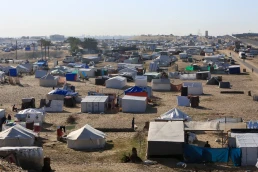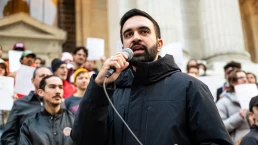If we want to win the future, we need to build a movement that will last beyond the next handful of electoral cycles.
By Ted Glick
So is it a lock that in November the Republicans are going to take back the House and Senate? Are the big things that progressives and people of good will have been fighting for since President Joe Biden was elected 14 months ago now up in fossil fuel smoke for years to come?
That’s what Mafioso Trump and his multitudinous supporters on Capitol Hill, in the right-wing media, and elsewhere are expecting. Their success in preventing the passage of Build Back Better and voting rights legislation thanks to collaborating corporatists Joe Manchin and Kyrsten Sinema have clearly emboldened them.
It’s easy for this current situation to strengthen people’s understandable cynicism about two party electoral politics in the USA. There’s no question that increased numbers of progressive and grassroots activists are thinking it’s a waste of time to be engaged in electoral politics. Honestly, I’ve been thinking about that myself in recent days and weeks. But thinking more deeply about it I’ve realized that this would be very shortsighted. It would be, quite frankly, ahistorical, as in not having learned from history.
Think of this: In the 1972 Presidential election Republican Richard Nixon defeated Democrat George McGovern in a landslide, 61-39% in the popular vote and winning all but one state and the District of Columbia. But a little more than a year and a half later, because of the Watergate Hotel break-in and what came after it, Nixon was gone — forced to resign, approval ratings at 25%, disgraced — and the Republicans, for several years, were in disarray.
There’s an obvious analogy to today. It is entirely possible that the work of the bipartisan Congressional committee investigating the January 6 neo-fascist attack on the Capitol, and the Justice Department’s continuing series of indictments for that attack, will lead to Trump and his accomplices being not just further discredited but hauled into court and convicted of treasonous criminality. That will not help the neo-fascist, vote suppressing, racist elements currently in control of the national Republican Party.
And what if (probably when) the pandemic lightens up, the winter ends, the spring arrives, people can open their windows, and the number of cases, hospitalizations and deaths goes way down? All of that is possible based on what public health and medical people are saying. A number of them believe that we will have Covid with us for some time to come, past 2022 almost certainly, but eventually in a much reduced and more manageable form.
If this is our reality by this summer, that will have political impacts on the body politic.
And there could be other developments that as of now are unforeseeable or uncertain. There’s 300 days to go until national Election Day, and that’s a long, long time.

Keeping Our Eyes On The Prize
But those of us who supported Bernie or Elizabeth in 2020, or who may not have done so but who understand that we need to fight for big deal, Green New Deal, health care for all, for-the-many-and-not-the-few legislation that passes as soon as possible — our thinking needs to go beyond the 2022 election cycle. We need to keep our eyes on the prize of fundamental social transformation, systemic change, government of the people, by the people and for the people, not the 1%.
A key, an absolute essential, if we are to do so is the strengthening of the already-developing, broadly-based, multi-racial, multicultural, multi-issue, multi-gender popular alliance, uniting people of color, women, youth, LGBTQ people, trade unionists, farmers, small business people, people with disabilities, professionals and others.
The billionaire class — overwhelmingly white, heterosexual men — that we are up against has extremely deep pockets and many guns to fire, both figuratively and literally, to hinder the social and economic transformation process, which they have done too many times to count down through history. But history also teaches that when masses of people, in the millions or tens of millions, are in political motion for revolutionary change, whether it be talking with family, neighbors and friends or risking life and limb in direct confrontation with police or military forces which ordinarily protect corporate power — then, and only then, is it possible for the change in who is in control of government to take place. In the words of a popular slogan I first heard in the global justice movement of the late 1990s, “there ain’t no power like the power of the people,” united and organized.
We have seen in the United States the power of this kind of alliance in recent decades. From 1984–1989 we saw it in the form of the independent National Rainbow Coalition, the two Jesse Jackson campaigns for President, the multi-issue, multi-racial, Democrats-and-independents alliance which had such a powerful political impact before that burgeoning initiative was consciously derailed in 1989 by the powers-that-be within the Democratic Party. In 2015 and 2016, and again in 2019 and 2020, we saw it in the Bernie Sanders Presidential campaigns and the growth in between them of the organization Our Revolution. The 2019–2020 Elizabeth Warren Presidential campaign was also important. We have seen it in mass mobilizations and mass movements around issues that have linked a broad cross-section of people: the massive Women’s March on January 21, 2017, an intersectional breadth of support and activism for the rights of immigrants, and several national mobilizations on the issue of the climate crisis over the decade of the 2010s, including the exciting, historic uprising of young people around the world in 2018 and 2019 in response to the actions taken and the press coverage received by 16-year-old Greta Thunberg of Sweden.
The persistent and growing organizing and activism around the urgent issue of the climate crisis is both a hopeful development and one which must be sustained and expanded. All life forms on earth are facing an historically imminent, existential threat to our future survival. In response, virtually all sectors listed above are speaking up and taking action. Without a doubt this issue is not just in urgent need of solutionary action; it is also helping to unite the social movements and constituencies that must be together to solve all of the crises created and aggravated by late-stage, transnational corporate capitalism via its replacement by a different system.
A Popular Alliance That’s Built To Last
Immanuel Wallerstein, in an important essay, Antisystemic Movements: History and Dilemmas, has written about essential aspects of how a popular alliance built to last and to win must be evolved: “It means first of all a conscious effort at empathetic understanding of the other movements, their histories, their priorities, their social bases, their current concerns. Correspondingly, increased empathy needs to be accompanied by restraint in rhetoric. It does not mean that movements should not be frank with each other, even in public. It means that the discussion needs to be self-consciously comradely, based on the recognition of a unifying objective, a relatively democratic, relatively egalitarian world.
“’Consequently, this means that the movements will have to devote considerably more energy than has historically been the case to inter-movement diplomacy. To the extent that the movements come to internalize the sense that the social transformation they are seeking will not occur in a single apocalyptic moment, but as a continuous process, one continually hard-fought, they may learn to concentrate their energies somewhat less exclusively on the immediate tactics of change and somewhat more on constructing middle-run stepping stones. In such a context, inter-movement diplomacy becomes a very useful expenditure of energy. It will make possible the combination of daring leaps and structural consolidation which could make plausible a progressive transformation of the world-system.”
This transformation will not take place through electoral activity alone. That is one leg of a three-legged stool of tactics that we must be and already are about. A second leg is conscious, on the ground, dialogical organizing.
The alliance movement must be grounded in day-to-day, community, workplace, and issue-based organizing by millions of volunteer and paid activists and organizers utilizing popular education, dialogical approaches, and techniques as much as possible.
Such people, these organizers, are the connective tissue which holds the popular alliance, movement of movements, together. History has shown how organizations bringing together and supporting such organizers can, over time, generate the broad, mass support and mass action essential once the alliance grows to the point where it can seriously contest for power.
The third leg is street heat and direct action campaigns.
The alliance must continually but strategically organize public marches, demonstrations, strikes, and nonviolent direct actions on key issues, as part of ongoing campaigns and in support of the overall alliance program.
Oppressed people need to see that there are others who feel the same way and are willing to take action to change things. Elected officials, even those who are supportive, need to appreciate the strength of people’s feelings via seeing it in action. And clearly, the targets of the public demonstrations need to see both sizable numbers of people involved and the urgency of their feelings.
Albert Camus, writing in 1951 in The Rebel, said: “Real generosity toward the future lies in giving all to the present.” In 2022, in the United States of America, these are words to take to heart.
This article contains numerous excerpts from Ted Glick’s recently published book, 21st Century Revolution: Through Higher Love, Racial Justice and Democratic Cooperation. More information and other writings can be found at https://tedglick.com.
Recent Posts
Stop Israel’s Dystopian “Humanitarian City” Plan—Before It’s Too Late
July 11, 2025
Take Action Now For the past 20 months, the world has watched—and largely enabled—a genocidal campaign in Gaza. Over 55,000 Palestinians have been…
The “Liberal” International Order Is Criminalizing Palestine Protests
July 11, 2025
Take Action Now As Western governments repress Palestine solidarity and enable Israel’s impunity, the “liberal international order” is no longer…
Politicians Are Betraying Gen Z On Climate
July 10, 2025
Take Action Now While Gen-Zers thrift, knit, crochet, and find other ways to reduce our footprints, Trump and the GOP are greenlighting more climate…
Trump’s Deportation Threat Against Zohran Mamdani Is Shameful
July 10, 2025
Take Action Now In only half a year of Donald Trump’s presidency, he and his allies have turned deportation into an explicitly political threat…




